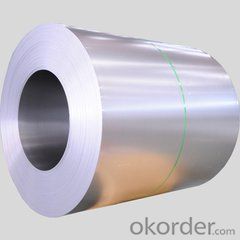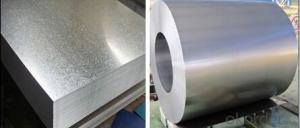Structure of Cold Rolled Steel Description
- Loading Port:
- China main port
- Payment Terms:
- TT OR LC
- Min Order Qty:
- 30 m.t.
- Supply Capability:
- 20000 m.t./month
OKorder Service Pledge
OKorder Financial Service
You Might Also Like
1.Structure of Cold Rolled Steel Description:
The raw material of cold rolled steel coil/sheet is high quality hot rolled product, and after pickling continuous rolling, degreasing, annealing,skin pass,slitting and cut to length line etc. Along with it many kinds of new technology and new process of global cold rolling production have been applied. Therefore the quality of the goods could be guaranteed. The product is widely used in outdoor and interior decoration, furnishing manufacturing, home appliance, automobile etc.
2.Main Features of the Cold Rolled Steel:
• Excellent process capability
• Smooth and flat surface
• Workability, durability
• Excellent heat resistance performance
• High strength
• Good formability
• Good visual effect
3.Cold Rolled Steel Images

4.Cold Rolled Steel Specification
Standard:AISI,ASTM,DIN,GB,JIS,JIS G3302 ASTM 653M EN10142
Grade: Q195~Q345
Thickness: 0.16mm~1.5mm,0.16-1.5mm
Width: 1250,600-1250mm
Coil weight:3-12 MT
Coil ID:508/610mm
Chemical composition:
C | Si | Mn | Cr | Ni | P | S |
0.150 | 0.476 | 11.231 | 12.50 | 0.900 | 0.039 | 0.010
|
5.FAQ of Cold Rolled Steel
We have organized several common questions for our clients,may help you sincerely:
1.How about your company?
A world class manufacturer & supplier of castings forging in carbon steel and alloy steel,is one of the large-scale professional investment casting production bases in China,consisting of both casting foundry forging and machining factory. Annually more than 8000 tons Precision casting and forging parts are exported to markets in Europe,America and Japan. OEM casting and forging service available according to customer’s requirements.
2.How to guarantee the quality of the products?
We have established the international advanced quality management system,every link from raw material to final product we have strict quality test;We resolutely put an end to unqualified products flowing into the market. At the same time, we will provide necessary follow-up service assurance.
3. How long can we receive the product after purchase?
Usually within thirty working days after receiving buyer’s advance payment or LC. We will arrange the factory manufacturing as soon as possible. The cargo readiness usually takes 15-25 days, but the shipment will depend on the vessel situation.
- Q:How are steel coils used in the manufacturing of garage doors?
- Steel coils are used in the manufacturing of garage doors as they provide the necessary strength and durability required for the door panels. These coils are formed into various shapes and sizes to create the panels, which are then coated and insulated to enhance their performance and appearance. The use of steel coils ensures that the garage doors are sturdy, long-lasting, and able to withstand the daily wear and tear associated with regular use.
- Q:How are steel coils processed for cutting to length or blanking?
- Steel coils are processed for cutting to length or blanking through a series of steps. First, the coils are uncoiled and straightened to remove any bends or twists. Then, they are fed through a machine that measures and marks the desired length or shape. Next, a cutting tool or die is used to precisely cut the steel into the required dimensions. Finally, the cut pieces are inspected for quality and packaged for shipment.
- Q:How are steel coils used in the manufacturing of fuel systems?
- Steel coils are commonly used in the manufacturing of fuel systems to create various components such as fuel tanks, pipes, and fittings. These coils are often shaped, cut, and welded to form the desired fuel system parts. The high strength and durability of steel make it an ideal material for fuel systems, ensuring the safe and efficient transportation of fuel.
- Q:Can steel coils be customized?
- Yes, steel coils can be customized according to specific requirements such as size, thickness, width, and even surface finish. Customization allows manufacturers to meet the unique needs of various industries and applications.
- Q:Question about steel type used in bridges.?
- Do you mean galvanized steel?
- Q:please i need your help in answering this question manufacturing process of steel containers and 20 references
- There are many types of steel containers and many different mnfg processes. There are also thousands of different steel alloys. Steel is used for canned food, compressed air cyclinders, hydraulic pressure vessels, electrical boxes, and many other containers. Steel containers are made out of sheet metal by soldering, brazing, spot welding, seam welding, riveting, bolting, screwing, etc. Heavier wall containers are fabricated of plate steel. Some steel containers are made by deforming the steel by extruding, forging, spin forming, drawing, ironing, etc. Some steel containers are made by machining. You should be able to find plenty of references if you search for these terms. good luck
- Q:How are steel coils used in the production of electrical connectors?
- Steel coils are used in the production of electrical connectors as a primary material for manufacturing the connector's housing or casing. The steel coils are typically shaped, cut, and formed into the desired shape and size before being further processed and assembled with other components to create the final electrical connector product.
- Q:How are steel coils shipped internationally?
- Steel coils are typically shipped internationally using cargo ships or freight trains. The coils are securely loaded onto flatbed or container vessels, ensuring they are properly secured to prevent any damage during transportation. This method allows for efficient and cost-effective transportation of large quantities of steel coils across the globe.
- Q:What is the role of steel coils in HVAC systems?
- Steel coils play a crucial role in HVAC (heating, ventilation, and air conditioning) systems as they are responsible for facilitating the transfer of heat between the air and the refrigerant. In HVAC systems, steel coils are typically used in two main components: the condenser coil and the evaporator coil. The condenser coil is located in the outdoor unit of an HVAC system and its primary function is to release the heat from the refrigerant into the surrounding air. This coil is made up of multiple steel tubes that are bent into a serpentine shape and are attached to aluminum fins. As the hot refrigerant flows through these tubes, the steel coils ensure maximum surface area contact with the surrounding air, allowing for efficient heat transfer. Through this process, the heat is dissipated into the outdoor environment, resulting in the cooling of the refrigerant. On the other hand, the evaporator coil is situated in the indoor unit of the HVAC system and its role is to absorb heat from the air inside the building. Similar to the condenser coil, the evaporator coil consists of steel tubes that are connected to aluminum fins. The refrigerant, in a cold state, flows through these tubes, and as warm air from the building passes over the coils, the heat is transferred from the air to the refrigerant. This heat absorption process cools down the air, which is then circulated back into the building, providing the desired cooling effect. Overall, steel coils in HVAC systems are essential for heat transfer between the air and the refrigerant. Their design and placement allow for efficient cooling or heating of the air, depending on the system's mode of operation. Without steel coils, HVAC systems would not be able to effectively regulate the temperature and provide the desired comfort levels in residential, commercial, and industrial buildings.
- Q:What are the different types of steel coil grades and specifications?
- In the market, one can find a variety of steel coil grades and specifications. These grades and specifications cater to different industry needs and applications. Several commonly used types include: 1. Hot Rolled Steel Coils: These coils are manufactured by heating the steel above its recrystallization temperature and then rolling it at a high temperature. They are often used in applications where dimensional accuracy and surface finish are not crucial. 2. Cold Rolled Steel Coils: Cold rolled steel coils are produced by subjecting hot rolled coils to further processing in cold reduction mills. This process enhances surface finish, tightens tolerances, and increases strength compared to hot rolled coils. They find wide applications in the automotive, construction, and electrical industries. 3. Galvanized Steel Coils: These coils are coated with a layer of zinc to protect them from corrosion. Galvanization improves the durability and longevity of the steel coils. They are commonly used in roofing, fencing, and automotive body parts. 4. Stainless Steel Coils: Made from a combination of iron, chromium, and other elements, stainless steel coils offer excellent corrosion resistance and high strength. They are widely used in industries such as food processing, chemical, and medical, where hygiene and corrosion resistance are critical. 5. High-strength Low-alloy (HSLA) Steel Coils: HSLA steel coils are designed to possess higher strength and improved formability compared to conventional carbon steels. They are commonly employed in structural and transportation applications where weight reduction and high strength are required. 6. Electrical Steel Coils: Also known as silicon steel or transformer steel, these coils are specifically designed for electrical equipment like transformers, motors, and generators. They exhibit low core losses and high magnetic permeability, ensuring efficient energy transfer. 7. Tool Steel Coils: Tool steel coils are specially formulated to possess high hardness, wear resistance, and toughness. They are commonly used in the production of cutting tools, dies, and molds. These examples represent only a fraction of the steel coil grades and specifications available in the market. The choice of the appropriate grade and specification depends on specific application requirements, such as strength, corrosion resistance, formability, and surface finish.
1. Manufacturer Overview |
|
|---|---|
| Location | |
| Year Established | |
| Annual Output Value | |
| Main Markets | |
| Company Certifications | |
2. Manufacturer Certificates |
|
|---|---|
| a) Certification Name | |
| Range | |
| Reference | |
| Validity Period | |
3. Manufacturer Capability |
|
|---|---|
| a)Trade Capacity | |
| Nearest Port | |
| Export Percentage | |
| No.of Employees in Trade Department | |
| Language Spoken: | |
| b)Factory Information | |
| Factory Size: | |
| No. of Production Lines | |
| Contract Manufacturing | |
| Product Price Range | |
Send your message to us
Structure of Cold Rolled Steel Description
- Loading Port:
- China main port
- Payment Terms:
- TT OR LC
- Min Order Qty:
- 30 m.t.
- Supply Capability:
- 20000 m.t./month
OKorder Service Pledge
OKorder Financial Service
Similar products
New products
Hot products
Related keywords





























